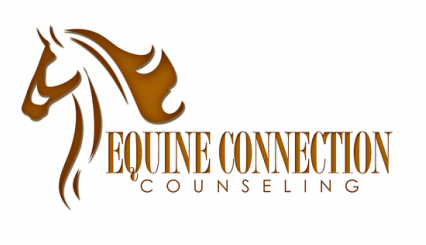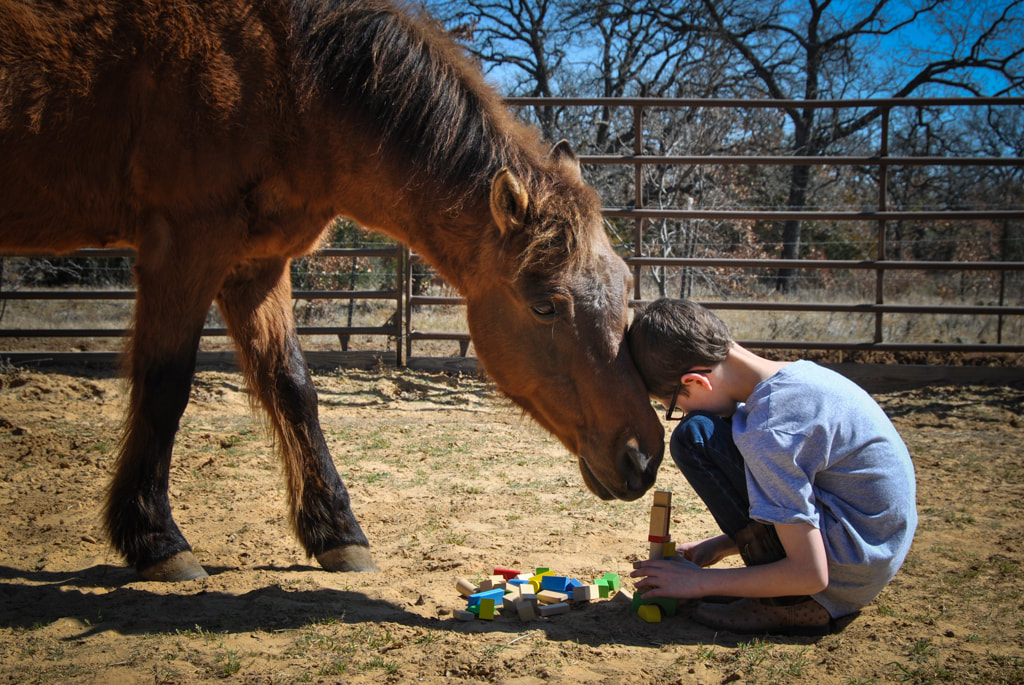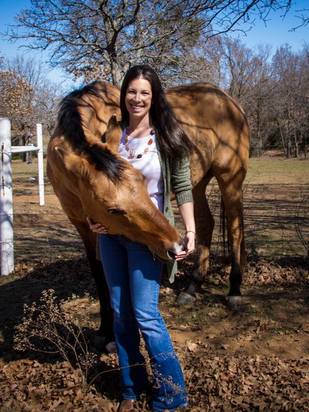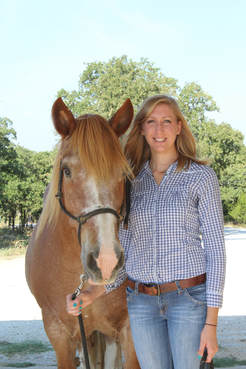Please stay tuned for our next EPPT training!Equine-Partnered Play Therapy (“EPPT”) is a unique play therapy model for children aged three to nine years old. The special relationship between children and animals has been documented throughout history. EPPT is evidence-informed and based on the principles of child-centered play therapy. The EPPT model is the first of its kind to blend CCPT and Equine Assisted Counseling. CCPT is based on the belief that, unlike adults, children are not able to talk through their problems. Instead, children see and explore the world through play. A child in play therapy will express thoughts, feelings, needs, and wants through toys used in play.
The presence of the horses provides several benefits to the child including: the opportunity for the child to express difficult feelings through the horse; providing and receiving nurturing from the horse; and receiving feedback from the horse to ground the session in reality. In EPPT, the horses are treated like group members, enabling the child to improve social skills while receiving feedback from the horses. The therapeutic benefits of EPPT include gains in self-control, decision-making, personal responsibility, self-direction, self-expression, self-respect, and self-acceptance. The EPPT model is facilitated by a treatment team comprised of a play therapist and equine specialist. There are many considerations in order to safely, ethically, and effectively integrate the horse into a play therapy session including creating a play area in which horses can be included, adapting CCPT facilitative responses for EPPT, establishing a safe physical and emotional environment for both horse and child, identifying and setting appropriate limits, and attending to group dynamics between the horse and child. The EPPT Model has been featured in world-renowned expert in animal assisted therapy, Dr. Cynthia Chandler’s, newest textbook, Animal Assisted Therapy in Counseling. |
Learning Objectives:
|
Presenter Information:
|
Hallie Sheade, Ph.D., LPC, RPT, NCC
Dr. Sheade runs a private practice, Equine Connection Counseling, PLLC, devoted solely to the practice of equine assisted counseling with children, teenagers, and adults in Texas. Dr. Sheade received her doctoral training in animal assisted therapy and play therapy at the University of North Texas. By adapting best practices in traditional psychotherapy, Dr. Sheade pioneered two innovative models, Relational Equine-Partnered Counseling (REPC) and Equine-Partnered Play Therapy (EPPT), for the practice of EAC. Dr. Sheade tested the effectiveness of the REPC model in working with military veterans with PTSD and found the model to provide benefits reducing distress related to PTSD. Dr. Sheade is committed to furthering the field of EAC by authoring manuscripts, presenting at local, national, and international conferences, and by training interns in the practice of EAC. She has also received a contract with an academic publisher to author a textbook on equine assisted counseling. Furthermore, Dr. Sheade is also an equine professional and has more than 25 years experience with horses. Dr. Sheade has achieved certification through PATH Intl. as both a certified Therapeutic Riding Instructor and Equine Specialist in Mental Health and Learning (ESMHL). Furthermore, Dr. Sheade is a Faculty Candidate for PATH Intl. ESMHL workshops to train and evaluate equine specialists. Danielle Crandall, M.S., LPC Intern (Under the supervision of Emily Michero, Ph.D., LPC-S Ms. Crandall has extensive experience in working with horses and has achieved certification as both a PATH Intl. Certified Therapeutic Riding Instructor and Equine Specialist in Mental Health and Learning. Ms. Crandall began practicing equine assisted counseling during her master’s student internship in 2016 and has continued since graduation as an LPC-Intern with Equine Connection Counseling. Ms. Crandall received her animal assisted therapy and play therapy training while completing her M.S. at the University of North Texas. Ms. Crandall has engaged in supervised experience in both office-based play and EAC (including both Relational Equine-Partnered Counseling and Equine-Partnered Play Therapy). Ms. Crandall continues to engage in supervised experience as an LPC-Intern at Equine Connection Counseling, PLLC. Ms. Crandall has served as both a counselor and equine specialist in facilitating EAC. Ms. Crandall has presented on EAC as an invited speaker for both graduate courses and community events. |
Continuing Education (CE/CEU) Information
The Equine-Partnered Play Therapy training workshop qualifies for 13.5 Contact CEUs.
The criteria that is used when Equine Connection Counseling plans its trainings is designed to fulfill the requirements for both the State of Texas'
Licensing Boards as well as Association for Play Therapy's criteria. While we do not apply for our trainings to be pre-approved by all of the
licensures, if you will look under the specifications for each licensure you will see that our trainings qualify to be used as CEs with most of
them. We will provide you with any needed documentation regarding attendance and workshop information (including learning objectives) if needed. There are more specifications concerning this criteria listed under each type of licensure.
Professional Organizations/Licensures - Mental Health
Association for Play Therapy
The EPPT training is pending pre-approval for CEUs from the Association for Play Therapy.
Please note: Play therapy credit will not be awarded to non-mental health professionals. Non-mental health professionals will receive a separate participation certificate to claim CEU credit through other organizations (e.g. PATH Intl.).
National Board for Certified Counselors (NBCC) - http://www.nbcc.org/resources/nccs/earnce
According the CE workshop requirements for NBCC:
"Continuing education is an integral part of professional practice. There are many ways you can earn continuing education credit. Any of the following activities will qualify for continuing education clock hours to recertify your board certification, as long as the activity relates to an approved content area." The EPPT training workshop is designed to fall under NBCC's Approved Content Area of Counseling Theory/Practice and the Counseling Relationship.
"NBCC ACEP approval is not required; however, the courses must meet NBCC guidelines for continuing education. A certificate, verification form or letter verifying attendance is required for documentation. The documentation must include your name, date attended, hours completed, program title and signature of presenter/provider."
National Association for Social Workers - http://www.naswdc.org/practice/standards/Continuing_Professional_Education.asp
NASW does not require CEs to be pre-approved for specialty certifications. Read more on specific requirements in the link above.
Licensed Psychologists - TX
According to the rule set forth by the Texas State Board of Psychologists, the Board does not pre-approve professional development credit. The EPPT training workshop falls under the category of "other formally organized groups providing professional development that is directly related to the practice of psychology. Examples of such providers include: public or private institutions, professional associations, and training institutes devoted to the study or practice of particular areas or fields of psychology; and professional associations relating to other mental health professions such as psychiatry, counseling, or social work." Please reference Rule 461.11 for more information.
Professional Organizations - Equine Professionals
Professional Association of Therapeutic Horsemanship (PATH) International - https://www.pathintl.org/resources-education/education/continuing-education
PATH Intl. does not pre-approve or require pre-approved CEs for the ESMHL certification. The EPPT training qualifies for General Continuing Education.
The criteria that is used when Equine Connection Counseling plans its trainings is designed to fulfill the requirements for both the State of Texas'
Licensing Boards as well as Association for Play Therapy's criteria. While we do not apply for our trainings to be pre-approved by all of the
licensures, if you will look under the specifications for each licensure you will see that our trainings qualify to be used as CEs with most of
them. We will provide you with any needed documentation regarding attendance and workshop information (including learning objectives) if needed. There are more specifications concerning this criteria listed under each type of licensure.
Professional Organizations/Licensures - Mental Health
Association for Play Therapy
The EPPT training is pending pre-approval for CEUs from the Association for Play Therapy.
Please note: Play therapy credit will not be awarded to non-mental health professionals. Non-mental health professionals will receive a separate participation certificate to claim CEU credit through other organizations (e.g. PATH Intl.).
National Board for Certified Counselors (NBCC) - http://www.nbcc.org/resources/nccs/earnce
According the CE workshop requirements for NBCC:
"Continuing education is an integral part of professional practice. There are many ways you can earn continuing education credit. Any of the following activities will qualify for continuing education clock hours to recertify your board certification, as long as the activity relates to an approved content area." The EPPT training workshop is designed to fall under NBCC's Approved Content Area of Counseling Theory/Practice and the Counseling Relationship.
"NBCC ACEP approval is not required; however, the courses must meet NBCC guidelines for continuing education. A certificate, verification form or letter verifying attendance is required for documentation. The documentation must include your name, date attended, hours completed, program title and signature of presenter/provider."
National Association for Social Workers - http://www.naswdc.org/practice/standards/Continuing_Professional_Education.asp
NASW does not require CEs to be pre-approved for specialty certifications. Read more on specific requirements in the link above.
Licensed Psychologists - TX
According to the rule set forth by the Texas State Board of Psychologists, the Board does not pre-approve professional development credit. The EPPT training workshop falls under the category of "other formally organized groups providing professional development that is directly related to the practice of psychology. Examples of such providers include: public or private institutions, professional associations, and training institutes devoted to the study or practice of particular areas or fields of psychology; and professional associations relating to other mental health professions such as psychiatry, counseling, or social work." Please reference Rule 461.11 for more information.
Professional Organizations - Equine Professionals
Professional Association of Therapeutic Horsemanship (PATH) International - https://www.pathintl.org/resources-education/education/continuing-education
PATH Intl. does not pre-approve or require pre-approved CEs for the ESMHL certification. The EPPT training qualifies for General Continuing Education.




